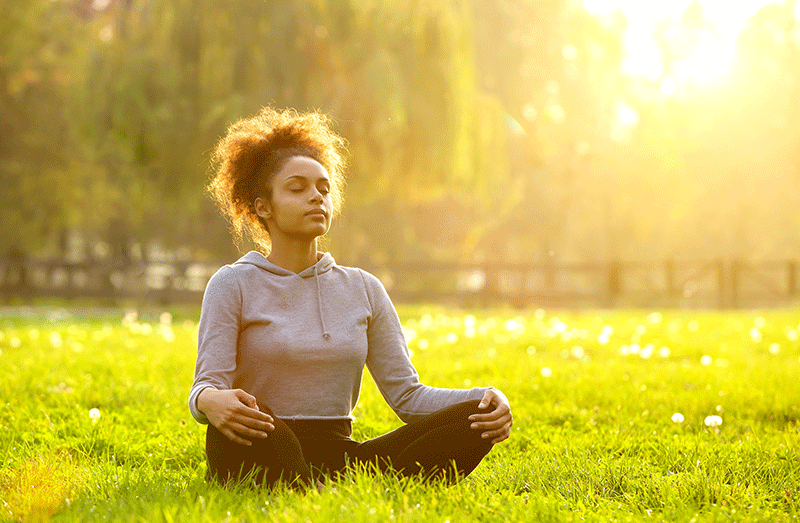Mindfulness Meditation is a powerful, mind-body practice that is designed for people who want to learn more about themselves, cope with everyday life, and improve their lives. It helps people deal with everyday stressors and allows them to take control over their emotions. Mindfulness meditation teaches you to live a life of stillness, compassion and patience. When practiced regularly, it can help reduce your stress levels, manage anxiety and depression, and decrease your disease risk. People from all walks of life have found Mindfulness Meditation to be an effective tool for improving their quality of life.
Mindfulness meditation uses guided imagery, mantra and physical exercises to bring about an overall sense of peace. It helps you become mindful and respond to your body's signals, helping you tune out the stressful thoughts and feelings that keep you awake at night or leave you frustrated and anxious throughout your day. Mindfulness meditation is an eight-week proven effort to help people eliminate anxiety, stress, depression, and pain naturally. You will learn to: observe yourself as you meditate, breathe deeply and regularly, observe and attend to your body's signals while you are meditating, and practice mindfulness. It also includes instruction on finding balance and staying present in your every day life.
Mindfulness exercises can be learned by beginners in mindfulness meditation or through workshops with experienced instructors. Most people start with basic meditation exercises such as sitting in a comfortable position, clearing your mind, repeating a word or short phrase, counting a number, or visualizing a pleasant object. Some people like to use music, smells, sound or a combination of any of these to further facilitate relaxation and set the mood. The exercises are not rigid and do not need to be followed strictly in order to be effective. You can easily experiment with different exercises to find what works best for you. Some people find that basic meditation techniques to help them relax, while others need more exercises to bring them to a state of deep rest and awareness.
Mindfulness is simply being aware of the moment. It does not mean ignoring all of the things that happen around you or trying to banish all thoughts of the past. A person who considers themselves to be mindful has a constant awareness of their bodily sensations as well as their thoughts. This helps you to understand your thoughts and how they effect your feelings and reactions. When you are in a state of meditation, you may be aware of your thoughts but not your sensations or emotions. Being mindful also means being alert to the physical body, breathing and sensations of touch and sound.
Like other forms of meditation, you can choose to learn mindfulness meditation based on the teachings of an instructor, purchase a book, or create your own Mindfulness Meditation DVD. There are many DVDs available that teach you how to develop and practice mindfulness meditation as well as related subjects such as nutrition and stress management. In fact, some of these Mindfulness Meditation DVDs focus on relaxation and how to relieve stress without meditating.
One important element of any mindfulness meditation program is breathing exercises. Breathing exercises can help you to relax and to bring your attention to your breath instead of your troubles. Another important part of any exercise program is relaxation exercises. These exercises help you calm the mind. Being tense and stressed can cause a headache and if you are tense, it is much more difficult for you to relax.
There are many other activities that are part of a mindful exercise program. Some of these include reading a book, watching television, spending time with friends and family, playing games, taking a walk, exercising and doing yoga. All of these activities can help you become more mindful and can add to your overall wellbeing. When you choose to engage in these activities, try not to force yourself to do them. If at all possible, attempt to do the activity without the use of medication or therapy. Meditation can be a helpful adjunct to your regular routine but it should not be considered as a replacement for your regular doctor visits.
The key to developing mindfulness is to find activities that you find relaxing and will stick with. This will help you develop the positive qualities of mindfulness such as calmness and serenity. You may also want to seek guidance from a teacher or a professional practitioner to learn more about guided meditation and to develop your own mindful exercises. Many people also learn more about the art of mindful eating by using Mindfulness Meditation DVDs.

Congratulations @agnesyt! You have completed the following achievement on the Hive blockchain and have been rewarded with new badge(s) :
Your next target is to reach 30 posts.
You can view your badges on your board and compare yourself to others in the Ranking
If you no longer want to receive notifications, reply to this comment with the word
STOPTo support your work, I also upvoted your post!